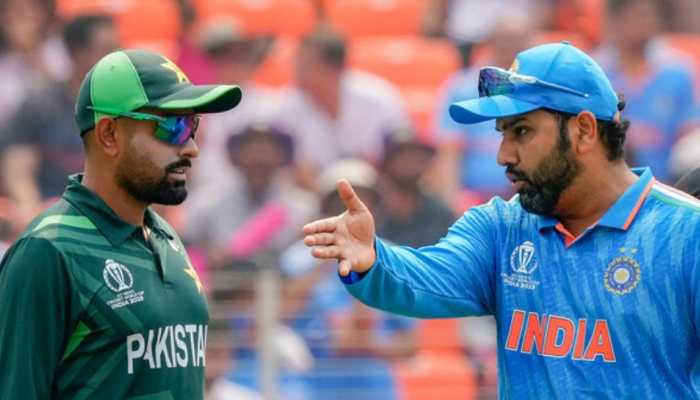French church attackers pledged allegiance to ISIS in video
Two jihadists who attacked a French church and killed a priest pledged allegiance to the Islamic State group, a video showed Wednesday, as investigators worked to identify the second assailant.
Trending Photos
)
Paris: Two jihadists who attacked a French church and killed a priest pledged allegiance to the Islamic State group, a video showed Wednesday, as investigators worked to identify the second assailant.
The attack is the third in two weeks in France and Germany in which jihadists have pledged allegiance to the group, increasing jitters in Europe over young, often unstable men being lured by IS propaganda and calls to carry out attacks in their home countries.
IS also claimed that Mohamed Lahouaiej Bouhlel, who killed 84 people when he ploughed a truck into a crowd in the French city of nice on July 14, was one of their "soldiers", however no direct link has been found.
France was still deep in mourning over the massacre when two men stormed into a church in the northern town of Saint-Etienne-du-Rouvray during morning mass Tuesday and slit the 86-year-old priest`s throat at the altar before being gunned down by police.
Another man was left seriously injured in a hostage drama, while three nuns and a worshipper escaped unharmed.
One of the attackers was identified as French jihadist Adel Kermiche, 19, who was awaiting trial on terror charges and had been fitted with an electronic tag despite calls from the prosecutor for him not to be released.
Sources close to the investigation said they found an identity card belonging to one Abdel Malik P., also 19, at Kermiche`s home, who they believe is the second attacker.
They said Abdel Malik "strongly resembles" a man hunted by anti-terrorism police in the days before the attack over fears he was about to carry out an act of terror.
In a video posted on the IS news agency Amaq, two bearded men, calling themselves by the noms de guerre Abu Omar and Abu Jalil al-Hanafi, hold hands as they swear "obedience" to IS leader Abu Bakr al-Baghdadi.President Francois Hollande, members of his government and opposition rivals gathered together at the symbolic Notre-Dame cathedral in Paris for a mass attended by Muslim, Jewish and Christian leaders to pay tribute to the murdered priest.
The moving gathering provided a rare show of unity and respite from days of political sniping over the repeat attacks, which right-wing parties say are due to the Socialist government`s failure to protect citizens.
"Those who drape themselves in the finery of religion to hide their deadly project, those who tell us of a God of death, a Moloch (false god) who rejoices in the death of man and promises heaven to those that kill by invoking him. They cannot hope that man gives in to their illusion," said Cardinal Andre Vingt-Trois at the service.
The mass came after a meeting earlier in the day between Hollande and top religious leaders who warned French people against being drawn in by IS efforts to pit different believers against each other.
Prime Minister Manuel Valls has warned that the goal of the attack, claimed by Islamic State jihadists, was to "set the French people against each other, attack religion in order to start a war of religions".
In an editorial, Le Monde newspaper wrote that France was under attack as it had one of the biggest Muslim communities in Europe.
"The jihadists` aim is to provoke violent revenge attacks that will create a religious war in our country," it said.
Pope Francis said "the world is at war" but argued that religion was not the cause.
"When I speak of war I speak of wars over interests, money, resources, not religion. All religions want peace, it`s the others who want war."
Residents of Saint-Etienne-du-Rouvray were struggling to come to terms with the bloodshed in their small town, so far from France`s tourist hubs.
They made their way to a makeshift memorial to lay flowers, candles and messages of peace -- a ritual that has become chillingly familiar from Brussels and Paris to Nice and Munich, all cities that have been struck by attackers inspired by the Islamic State group.
The government, already under pressure after the Nice attack, faced more questions over security weaknesses after it emerged Kermiche was known to anti-terror investigators.
Paris prosecutor Francois Molins said Kermiche twice tried to travel to Syria under a false identity. After his latest arrest in Turkey in May 2015, he was held in custody until March this year when he was released and fitted with the electronic bracelet.
Annie Geslin, who worked with Kermiche`s mother for many years, told AFP "he was the youngest child and had psychological problems."
Mohammed Karabila, who heads the regional council of Muslim worship for Haute Normandie, where the church attack took place, asked simply: "How could a person wearing an electronic bracelet carry out an attack? Where are the police?"
Stay informed on all the latest news, real-time breaking news updates, and follow all the important headlines in india news and world News on Zee News.
Live Tv







)
)
)
)
)
)
)
)
)
)
